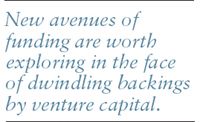Crowdfunding: The Open-Source Option Against Capital Crunch
Is crowdfunding an attractive alternative to finance pharma and biotech start-ups? Seth R. Ogden and M. Andrew Holtman report.
Crowdfunding has proven to be an attractive financing mechanism for smaller start-ups seeking to market consumer products, video games, and even movies. Remarkably, KickStarter has raised over $1 billion through donation- and reward-based models that avoid SEC regulations prohibiting crowdfunding platforms from offering equity or debt securities. The SEC's recent roll-out of the changes implemented by the Jumpstart Our Businesses (JOBS) Act will enable a wider swathe of capital-intensive businesses, such as biotech and pharma start-ups, to utilize publicly advertised securities-based offerings outside of the IPO context. Such new avenues of funding are worth exploring in the face of dwindling backings by venture capital, but, as illustrated by recent crowdfunded offerings, capital-seeking companies must be wary of potential liability from online advertising that could be deemed materially misleading.
The JOBS Act
Passage of the JOBS Act in April 2012 altered the financing landscape by directing the SEC to promulgate new rules to increase start-ups' access to capital. The amendments to Regulation D (Reg D) and Regulation A (Reg A) create important mechanisms for "more efficient" solicitation of investments from a wider pool of investors. Amended Reg D Rule 506 lifts the ban on general solicitation for offerings to accredited investors. As for Reg A, which already allows for publicly advertised offerings to both accredited and non-accredited investors, proposed rules will create a new second tier of exemptions ("Reg A+"), with an offering limit increase from $5 million to $50 million.
REG D
Reg D has always been a popular funding avenue for biotech and pharma relative to other exempt offerings, as it allows for offerings to accredited investors with no limitation on the aggregate amount. For example, a recent study indicated that in 2012 private offerings under exemptions such as Reg D eclipsed public ones by 42%. However, the amendments to Reg D eliminate the prohibition on general solicitation or advertising—a nonstarter in the context of online public offerings—so long as "the issuer takes reasonable steps to verify that purchasers are accredited investors."
The resulting increased interest brought about three portals supporting online public offerings of biotech/pharma securities soon after enactment of the amendments: VentureHealth LLC (www.venturehealth.com); Poliwogg (www.poliwogg.com); and HealthiosXChange (www.healthiosxchange.com). VentureHealth provides for purchase of an ownership interest in a special purchase venture capital fund that holds securities in a private company. In contrast, Poliwogg and HealthiosXChange allow direct purchases of securities. Poliwogg specifically identifies on its portal an online Reg D offering—common stock in Neurotez, a company focused on Alzheimer's treatments—and it lists three additional offers as "coming soon."
Online portals provide benefits to both offerors and investors. Start-ups can efficiently reach a large number of investors through online exposure and the potential to create special purpose vehicles that allow offerors to deal with a single entity—the portal—rather than scores of individual investors. Investors can efficiently find and review investment opportunities and pool funds, thereby lowering the minimum required investment. Thus, the final rules amending Reg D provide new incentives to seek capital through Reg D offerings.
Reg A+
The pre-JOBS Act Reg A exempts issuers from filing a full federal registration, instead allowing a "mini-registration" process requiring the filing of an offering statement (a limited registration statement) and an offering circular (a disclosure and selling document akin to a limited prospectus). Reg A already possesses certain positive attributes:
» Securities may be offered to any number of prospective investors, accredited or not.
» General solicitation and advertising are permitted.
» Shares may be freely traded by purchasers on the open market.
» Issuers may test the waters prior to engaging in the mini-registration process.
However, Reg A limits offerings to $5 million, which does not typically meet the threshold required by biotech/pharma ventures, though such offerings have occurred.
Therefore, Congress created Reg A+, in part, to allow for an aggregate offering amount of up to $50 million. Issuers must provide audited financial statements both in the offering statement and annually, and, although such auditing costs are not trivial, the overall reduced costs of the mini-registration process, estimated at anywhere from $40,000 to $125,000, remain significantly less than that of a registered offering. Taken together, the reduced registration costs, increased offering limit, and ability to solicit, advertise, and sell a liquid security to any type of investor make Reg A+ an ideal capitalization vehicle for direct online public offering by biotech/pharma businesses.

However, there's no assurance that the final rules governing Reg A+ will provide for preemption of state Blue Sky laws. This has not dissuaded at least some biotech/pharma startups from taking advantage of pre-JOBS Act Reg A. For example, Easton Pharmaceuticals filed a Reg A offering statement for $5 million dollars per year to piggy-back on financing obtained under Reg D, though the offering was only made to "current financing partners." Because investors need not be accredited, Reg A+ can provide a valuable new avenue of funding at the growth stage of a company's development cycle. Moreover, the reduced administrative costs allow growing companies to direct a larger percentage of funds toward clinical testing and research and development critical to attracting future investment. However, unless and until the SEC promulgates final rules preempting state Blue Sky laws, it is unclear that offerors will use Reg A+ in online public offerings potentially involving scores of investors residing in numerous states.
Disclosures under Reg D and Reg A+ offerings
To engage the network of potential investors, companies must publicize substantial information about their products. The increased exposure accompanying online advertising may heighten SEC scrutiny of public disclosures. According to the proposed rules, both issuers and advisors face civil liability if information provided is deemed materially misleading, i.e., information that either (1) contains an untrue statement of a material fact, or (2) omits a material fact necessary to make a statement not misleading, when there's a substantial likelihood that such a statement would have been viewed by the reasonable investor as having significantly altered the total mix of available information.
Some disclosure requirements tend to be more straightforward. For example, a Reg A offering requires a current balance sheet and income statements for a period of two years prepared in accordance with GAAP. However, disclosure requirements for intangible assets, like IP, which may constitute a biotech/pharma start-ups single most valuable asset, are subjective and case-specific. In particular, disclosure issues arise when a start-up must endeavor to provide enough to attract investors without divulging so much information as to give the competition a leg up.
Where a company generates revenue primarily from its IP, it could be argued that disclosure or non-disclosure of IP-related information significantly alters the total mix of information, rendering it material. Shareholder lawsuits can arise in a number of IP-related contexts, including ownership and assignment, patent application status, patent claim coverage, licensing details, expiration dates, patent counsel opinions, or status of ongoing litigation. See, e.g., Nathenson v. Zonagen, Inc., 267 F.3d 400 (5th Cir. 2001); Pommer v. Medtest Corp., 961 F.2d 620 (7th Cir. 1992); Alna Capital Assocs. V. Wagner, 532 F. Supp. 591 (S.D. Fla. 1982).
Though insufficient time has passed for shareholder lawsuits to result from offerings under the amended provisions of the JOBS Act, the non-equity crowdfunding context is illustrative. Recently, 3D Systems, Inc., owner of several patents in the 3D printing arena, filed a patent infringement suit against start-up Formlabs Inc. and Kickstarter. Though Formlabs publicly noted the expiration of certain potential blocking patents for its product, it did not address several still in force. Had investors purchased securities rather than rewards rights, Formlabs' failure to disclose such patents held by the competition might have created additional problems. This example illustrates how a company seeking to generate investment through online public offerings could inadvertently end up facing liability.
A big boost, but be aware
Amended Reg D and Reg A+ provide exciting new opportunities for biotech/pharma start-ups to raise capital through online public offerings. These new exemptions will only foster an increase in potential investors and, concomitantly, potential investment dollars. But companies who generate revenue primarily from their IP, such as those in the biotech/pharma sector, must be wary of potential liability that can arise from online advertising.

Seth R. Ogden, PhD, and M. Andrew Holtman, PhD, are attorneys at Finnegan, Henderson, Farabow, Garrett & Dunner LLP. They can be reached at seth.ogden@finnegan.com and andy.holtman@finnegan.com, respectively.

Regeneron, Roche Launch Major US Expansion Plans to Meet Growing Demand for Biologics and Innovation
April 22nd 2025With combined investments exceeding $53 billion, both companies are deepening their US presence through expanded biologics production, gene therapy capabilities, and next generation R&D centers.